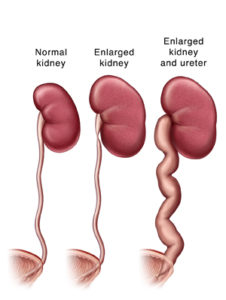
Three images of left kidney, ureter, and upper part of coronally sectioned bladder showing normal anatomy, obstruction high in ureter, and obstruction at bladder with megaureter.
Kidneys can be swollen or enlarged for many different reasons. An inflamed or swollen kidney can be a sign of infection, of polycystic kidney disease, of damage to the kidney from trauma or some other cause, or of a fairly advanced stage of chronic kidney disease. Although not all cases of kidney swelling are signs of a dangerous medical condition, as a symptom swollen kidneys should always be taken seriously and as a call for further diagnostic testing and treatment considerations.
Causes Of Swollen Kidneys
Almost any disorder of the kidneys can cause kidney inflammation or swelling. Some of the most common causes are listed and described below.
Glomerulonephritis
Glomerulonephritis is a syndrome in which the glomuleri, which perform filtering action inside the kidneys, fail to perform their functions properly, allowing toxins to build up in the kidneys. This can result from infections and sometimes from immune disorders. When that happens, the buildup of waste materials and toxic substances in the kidneys can cause kidney inflammation.
Hydronephrosis
Hydronephrosis is a backup of urine due to blockage or obstruction of the urinary tract “downstream” from the kidneys. The blocked passages cause urine to reflux back into the kidneys and the kidneys present as inflamed and swollen due to fluid excess.
Polycystic Kidney Disease
Polycystic kidney disease (PKD) is a genetic disorder in which the kidneys develop multiple cysts and become inflamed due to fluid accumulation. This is a very serious illness and leads over time to renal failure, and swollen kidneys are one of the diagnostic signs of the illness that should be looked for if a patient has a family history of PKD.
Vesicoureteral Reflux
Vesicouretaral reflux is a condition that sometimes arises following a urinary tract infection, particularly in children. It is a reflux of urine back into the kidney passages from the bladder.
Chronic Kidney Disease
Chronic kidney disease, also known as progressive kidney disease, progressive renal failure, and by similar names, is a condition in which the kidneys’ function is lost over a period of time due to progressive kidney damage. Enlarged kidneys are one symptom of chronic kidney disease.
Diagnosis
Swollen kidneys are a symptom rather than a disease, but identifying the presence of swollen kidneys can help diagnoses diseases of which they are a symptom. Swollen kidneys may or may not be associated with pain or with visible swelling of the abdomen. The condition of the kidneys can usually be identified with an ultrasound, however. Other indications that something is wrong with the kidneys include blood tests and urine tests for the presence of protein in the urine or waste chemicals in the blood, indicating impairment of kidney function.
Treatment
Treatment for enlarged or swollen kidneys depends on the underlying cause of the symptom. In many cases, a bacterial infection is at fault. This is the case with urinary tract infections and with many cases of glomulonephritis. Antibiotics are a standard prescription for bacterial infections.
In other cases, surgery to drain cysts or to remove obstructions of the urinary tract may be called for. If the kidneys are swollen due to damage inflicted by high blood pressure or excessive alcohol consumption, lifestyle changes and/or medication may be prescribed to correct the causative condition or behavior.
Prognosis
Prognosis with swollen kidneys may be anything from good to terminal depending on what is causing the kidneys to be inflamed. In many cases, the condition resolves itself naturally once the infection or other cause is taken care of. The kidneys can be inflamed for a time without any permanent damage ensuing. In other cases the prognosis can be much worse. In any case, a swollen kidney is cause for medical concern
and for monitoring and care.
